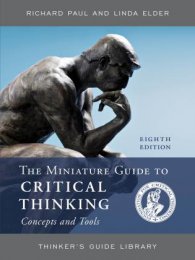Additional Information About:
The Miniature Guide to Critical Thinking Concepts & Tools
Critical Thinking
Everyone thinks; it is our nature to do so. But much of our thinking, left to itself, is biased, distorted, partial, uninformed or down-right prejudiced. Yet the quality of our life and that of what we produce, make, or build depends precisely on the quality of our thought. Shoddy thinking is costly, both in money and in quality of life. Excellence in thought, however, must be systematically cultivated.
Critical thinking is the art of analyzing and evaluating thinking with a view to improving it. Critical thinking is self-directed, self-disciplined, self-monitored, and self-corrective thinking. It requires rigorous standards of excellence and mindful command of their use. It entails effective communication and problem-solving abilities and a commitment to overcoming our native egocentrism and sociocentrism.
Concepts and Tools
This miniature guide focuses on of the essence of critical thinking concepts and tools distilled into pocket size. For faculty, it provides a shared concept of critical thinking. For students, it is a critical thinking supplement to any textbook for any course. Faculty can use it to design instruction, assignments, and tests in any subject. Students can use it to improve their learning in any content area. It's generic skills apply to all subjects. For example, critical thinkers are clear as to the purpose at hand and the question at issue. They question information, conclusions, and points of view. They strive to be clear, accurate, precise, and relevant. They seek to think beneath the surface, to be logical, and fair. They apply these skills to their reading and writing as well as to their speaking and listening. They apply them in history, science, math, philosophy, and the arts; in professional and personal life.
Table of Contents
Introduction
Why Critical Thinking?
Stages of Critical Thinking Development
A Substantive Approach to Critical Thinking
Critical Thinkers Routinely Apply Intellectual Standards to the
Elements of Reasoning
Three Types of Character
The Elements of Thought
Questions Using the Elements of Thought
A Checklist for Reasoning
The Figuring Mind
Universal Intellectual Standards
Some Essential Intellectual Standards for All Human Thought
Where Do Intellectual Standards Come From?
Intellectual Virtues of the Fairminded Critical Thinker
Essential Intellectual Traits
How Intellectual Virtues Are Interrelated
The Spirit of Critical Thinking
Template for Analyzing the Logic of an Article
Criteria for Evaluating Reasoning
A Template for Problem-Solving
Analyzing and Assessing Research
Three Kinds of Questions
Three Levels of Thought
The Human Mind Is Frequently Irrational While Having the Capacity for Rational Thought
Humans Often Distort Reality Through Irrational Lenses
The Problem of Egocentric Thinking
Feelings That Accompany Egocentrism
The Problem of Sociocentric Thinking
Primary Forms of Sociocentric Thought
Unethical Pursuit of Group Agendas
Envisioning Critical Societies
Twenty Barriers to Critical Societies
